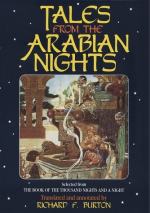needful for a carouse. Then he said to his servant,
“Go, fetch a porter and take this chest to the
house of Khoja Such-an-one, and say, ‘My master
has sent this to remain in your charge,’ and
leave it and come away. And again on the morrow
go and fetch it, saying, ‘My master wishes the
chest.’” So the servant went for a porter,
and the Khoja hid himself in the chest. Then the
boy laded the porter with the chest and took it to
the other Khoja’s house, where he left it and
went away. When it was night the Khoja came forth
from the chest, and he saw a moon-face sleeping in
the bed-clothes, and a candle was burning in a candlestick
at his head; and when the Khoja beheld this he was
confounded and exclaimed, “And blessed be God,
the fairest of Creators!"[FN#426] Then the Khoja laid
out the wine and so forth; and he went up softly and
waked the boy. And the boy arose from his place
and addressed himself to speak, saying, “Wherefore
hast thou come here?” Straight-way the Khoja
filled a cup and gave it to him, saying, “Drink
this, and then I shall tell thee what manner of man
I am.” And he besought the boy and spread
out sequins before him. So the boy took the cup
and drank what was in it. When the Khoja had
given him to drink three or four cups the face of the
boy grew tulip-hued, and he became heated with the
wine and began to sport with the Khoja. So all
that night till morning did the Khoja make merry with
the boy; and whatsoever his desire was, he attained
thereto. When it was morning, the Khoja again
went into the chest; and the servant came and laded
the porter with the same and took it back to his house.
And on the morrow, when the boy and his father were
sitting together, the mu’ezzin chanted the call
to prayer, whereupon the boy exclaimed, “Out
on thee, father; and the boy who is undone dies, and
so this fellow goes up there and bawls out; last night
they undid me; how is it that I am not dead?”
Then the father smote the boy on the mouth and said,
“Speak not such words; they are a shame.”
And then he knew why the chest had come.
Arabian Nights,
Volume 14
Footnotes
[FN#1] From the Wortley Montague Ms. vol. iii.
pp. 80-96. J. Scott: vol. vi. pp. 1-7.
Histoire du Sulthan d’Yemen et de ses trots
fils; Gauttier vol. vi. pp. 158-165.
[FN#2] The worst disease in human life, now recognised
as “Annus Domini.”
[FN#3] Arab. “Mal wa Ghawal”:
in Badawi parlance “Mal” would=flocks
and herds (pecunia, pecus); and amongst the burghers=ready
money, coin. Another favourite jingle of similar
import is “Mal wa Nawal.”
There is an older form of the Sultan of Al Yaman and
his three sons, to be found in M. Zotenberg’s
“Chronique de Tabari,” vol. ii. pp. 357-61.
[FN#4] In the W. M. Ms. the sisters are called
“Shahrzadeh” (=City born) and “Dinarzadeh”
(=ducat born) and the royal brothers Shahrbaz (=City
player or City falcon) and Kahraman (vol. i. p. 1)
alias Samarban (ibid.). I shall retain the old
spelling.




